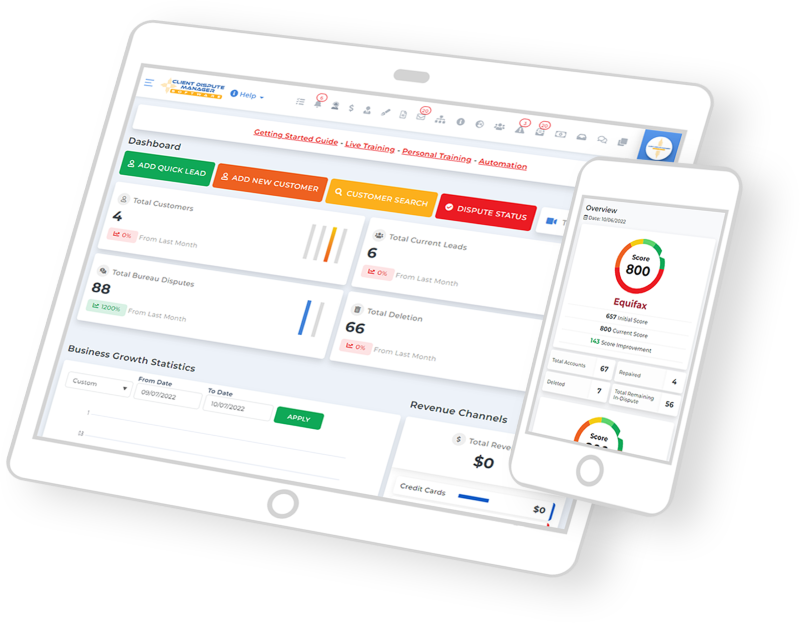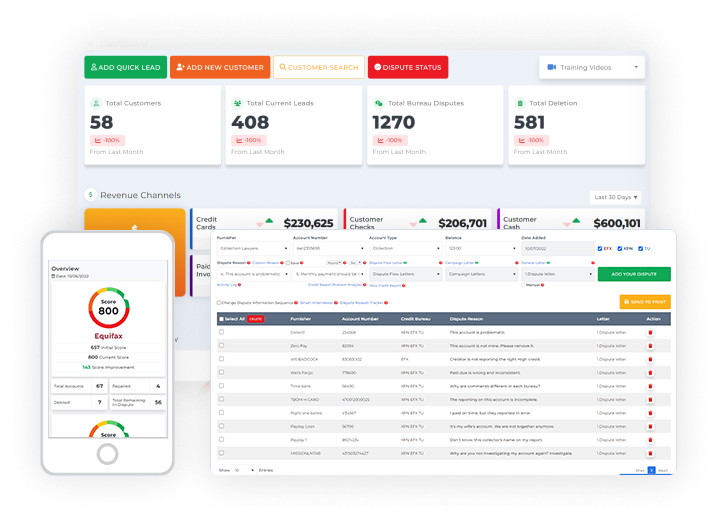Are you considering starting a credit repair business? If so, ensuring credit repair data confidentiality and security should be a top priority. In this article, we’ll explore the importance of safeguarding your clients’ sensitive information and provide a detailed plan to help you maintain credit repair compliance and protect your business’s reputation.
We’ll also discuss the legal requirements, business registration, and marketing strategies to help you launch a successful credit repair venture while prioritizing credit repair client privacy.
Start Today and Explore the Features Firsthand!
Why is Credit Repair Data Confidentiality Critical for Your Credit Repair Business Reputation?
When clients entrust you with their personal and financial information, they expect you to keep it secure. Failing to protect client data can lead to legal consequences and damage your credit repair business reputation. By prioritizing credit repair data security and privacy, you demonstrate your commitment to your clients’ well-being and establish trust in your services, ultimately enhancing your credit repair business reputation.
Implementing a Comprehensive Data Security Plan to Ensure Credit Repair Data Compliance
Familiarize yourself with relevant laws and regulations, such as the Gramm-Leach-Bliley Act (GLBA) and the Fair Credit Reporting Act (FCRA). These laws outline specific requirements for protecting consumer information in the financial sector and ensuring credit repair data compliance.
For example, the GLBA requires financial institutions to implement safeguards to protect customer information, while the FCRA regulates how credit repair businesses can access and use consumer credit reports, crucial for maintaining credit repair data security.
Developing a Written Information Security Plan (WISP)
Create a detailed document that outlines your company’s data security policies and procedures to maintain credit repair data confidentiality. Your WISP should cover topics like employee training, access controls, and incident response protocols. It should also include a risk assessment to identify potential vulnerabilities and a plan to address them, ensuring credit repair data compliance.
Regularly review and update your WISP to ensure it remains current and effective in protecting credit repair client privacy.
Implementing Strong Access Controls for Credit Repair Data Security
Restrict access to client data on a need-to-know basis to maintain credit repair data security. Use unique login credentials for each employee and regularly update passwords. Consider implementing two-factor authentication for added security.
Limit physical access to servers and workstations containing sensitive information. Regularly review access logs to identify and investigate any suspicious activity, further enhancing credit repair data confidentiality.
Encrypting Sensitive Data

Use encryption to protect client information both in transit and at rest, a crucial aspect of credit repair data security. This ensures that even if data is intercepted or stolen, it remains unreadable without the proper decryption key, maintaining credit repair client privacy.
Implement industry-standard encryption methods, such as AES-256, for storing and transmitting data. Use secure communication channels, such as SSL/TLS, when exchanging sensitive information with clients or third parties, ensuring credit repair data compliance.
Training Your Employees on Credit Repair Data Security and Compliance
Educate your staff on the importance of credit repair data security and privacy. Provide regular training on best practices, such as identifying phishing attempts and handling client information responsibly.
Ensure employees understand the consequences of data breaches and their role in preventing them, critical for maintaining credit repair client privacy. Conduct periodic refresher training to keep data security top of mind and reinforce credit repair data compliance.
Start Today and Explore the Features Firsthand!
Monitoring and Auditing for Credit Repair Data Confidentiality
Regularly monitor your systems for suspicious activity and conduct periodic audits to ensure compliance with your security policies and credit repair data confidentiality standards. Use intrusion detection and prevention systems to identify potential threats.
Perform vulnerability scans and penetration testing to identify weaknesses in your security posture. Promptly address any vulnerabilities or breaches and take steps to prevent future incidents, maintaining credit repair data security and compliance.
Having an Incident Response Plan for Credit Repair Client Privacy
Develop a clear plan of action for responding to potential data breaches that may compromise credit repair client privacy. This should include steps for containing the incident, notifying affected clients, and mitigating damage.
Designate a response team and clearly define their roles and responsibilities. Regularly test your incident response plan through simulated exercises to ensure its effectiveness in maintaining credit repair data security and compliance.
Legal Requirements and Business Registration for Credit Repair Data Compliance

When starting a credit repair business, it’s essential to understand and comply with the legal requirements to ensure credit repair data compliance. In the United States, credit repair businesses are regulated by the Credit Repair Organizations Act (CROA).
This federal law prohibits credit repair companies from making false or misleading statements, charging upfront fees, and requires them to provide clients with a written contract outlining their rights, crucial for maintaining credit repair client privacy.
To operate legally and maintain credit repair data compliance, you must register your credit repair business with the appropriate state and local authorities. This typically involves obtaining a business license and registering with your state’s Secretary of State office.
You may also need to obtain a surety bond, which provides financial protection for your clients in case of misconduct or non-performance, further enhancing your credit repair business reputation.
Marketing Strategies that Prioritize Credit Repair Data Security
To market your credit repair business effectively while prioritizing credit repair data security, focus on educating your target audience about the importance of good credit and how your services can help them achieve their financial goals. Develop a strong online presence through a professional website, social media profiles, and targeted advertising.
Engage with potential clients by providing valuable content, such as blog posts, videos, and free resources related to credit improvement, while emphasizing your commitment to credit repair client privacy and data confidentiality.
Networking is also crucial for growing your credit repair business while maintaining credit repair data compliance. Attend industry events, join professional associations, and collaborate with complementary businesses, such as mortgage brokers and financial advisors.
Building relationships with these professionals can lead to valuable referrals and partnerships, allowing you to expand your reach while upholding credit repair data security standards.
Utilizing Client Dispute Manager Software for Enhanced Credit Repair Data Security

In addition to the comprehensive data security plan outlined above, consider investing in a reliable software like Client Dispute Manager Software to further enhance credit repair data confidentiality and compliance. A well-designed client dispute manager software can streamline your credit repair processes while ensuring the highest level of data security and privacy.
Client Dispute Manager Software offers several benefits for your credit repair business:
- Secure Data Storage: The software provides a centralized, secure platform for storing and managing sensitive client information, reducing the risk of data breaches and unauthorized access.
- Access Control: With a client dispute manager software, you can easily manage user roles and permissions, ensuring that only authorized personnel can access client data on a need-to-know basis, further enhancing credit repair data security.
- Encrypted Communications: The software enables secure, encrypted communication channels for exchanging sensitive information with clients and third parties, maintaining credit repair client privacy and compliance.
- Audit Trails: A client dispute manager software automatically logs user activities and changes made to client records, providing a detailed audit trail for monitoring and investigating any suspicious activity, crucial for maintaining credit repair data confidentiality.
- Automated Compliance Checks: Some client dispute manager software solutions offer built-in compliance checks and alerts, helping you stay up-to-date with the latest credit repair data compliance regulations and industry best practices.
By leveraging the right technology, you can significantly enhance your credit repair business’s ability to protect client data, maintain compliance, and build a strong reputation in the industry.
Start Today and Explore the Features Firsthand!
Frequently Asked Questions (FAQs)
What is the Gramm-Leach-Bliley Act (GLBA) and How Does it Affect Credit Repair Data Compliance?
The GLBA is a federal law that requires financial institutions, including credit repair businesses, to protect the confidentiality and security of customer information, ensuring credit repair data compliance. It mandates the creation of a written information security plan and the implementation of appropriate safeguards to protect customer data, crucial for maintaining credit repair client privacy and enhancing your credit repair business reputation.
How Often Should I Update My Written Information Security Plan (WISP) for Credit Repair Data Security?
It’s a good practice to review and update your WISP at least annually or whenever significant changes occur in your business or the regulatory landscape to maintain credit repair data security and compliance. Regularly assessing your security posture and making necessary adjustments helps ensure the ongoing protection of client data and credit repair client privacy, ultimately strengthening your credit repair business reputation.
What Should I Do if I Suspect a Data Breach that Compromises Credit Repair Data Confidentiality?
If you suspect a data breach that may compromise credit repair data confidentiality, immediately activate your incident response plan. Contain the breach, investigate the extent of the damage, and notify affected clients and relevant authorities as required by law to maintain credit repair data compliance.
Work with legal counsel and cybersecurity experts to mitigate the impact and prevent future incidents, protecting credit repair client privacy and your credit repair business reputation.
How Can I Ensure My Employees Handle Client Data Responsibly to Maintain Credit Repair Client Privacy?
Provide thorough training on credit repair data security best practices and have employees sign confidentiality agreements to maintain credit repair client privacy. Regularly reinforce the importance of protecting client information through ongoing education and communication.
Implement strict access controls and monitor employee activity to identify any potential misuse of data, ensuring credit repair data compliance and safeguarding your credit repair business reputation.
Conclusion
Safeguarding credit repair data confidentiality and client privacy is essential for maintaining your credit repair business reputation and avoiding legal consequences. By implementing a comprehensive data security plan, training your employees, and staying vigilant, you can demonstrate your commitment to protecting your clients’ sensitive information and build trust in your services, ultimately enhancing your credit repair business reputation.
Remember to comply with legal requirements, register your business properly, and develop effective marketing strategies to attract and retain clients while prioritizing credit repair data security and compliance.
By following these guidelines and prioritizing credit repair client privacy, you can establish a thriving credit repair business that helps individuals improve their financial lives while keeping their information safe and secure, solidifying your credit repair business reputation.

Mark Clayborne
Mark Clayborne specializes in credit repair, starting and running credit repair businesses. He's passionate about helping businesses gain freedom from their 9-5 and live the life they really want. You can follow him on YouTube.
Start Today and Explore the Features Firsthand!
Below Is More Content For Your Review:
- The Top Mistakes in the Credit Repair Business and How to Avoid Them
- Can Credit Repair Software Guarantee a Higher Credit Score?



